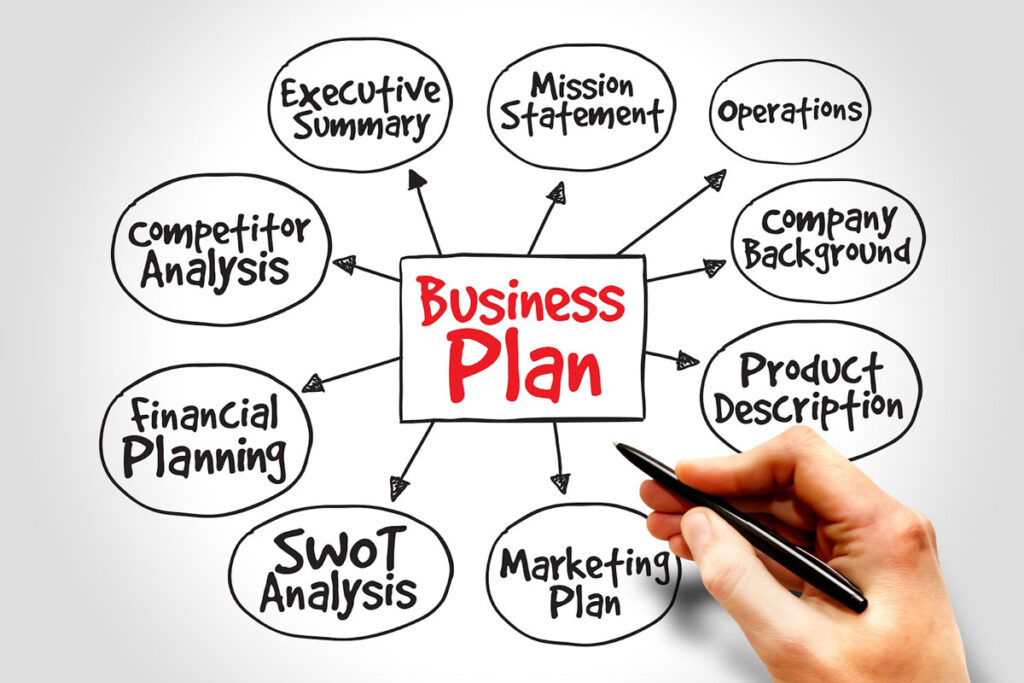In a time where everything is fast-paced, it’s important you don’t get left behind, especially if you’re a business owner. Whether it’s the latest trends or changing market dynamics, you need to lead with you’re A-game.
Just like in any game, you need a plan to win. Otherwise, it’s easy to get lost in the labyrinth of uncertainty. And that’s why we’re here to help you continue conquering markets with our “How to come up with a business plan? – 101”.
It’s time you start crafting strategies for tomorrow’s successes and stay ahead of the competition. All you need is a good business plan that factors in all the current and somewhat future challenges, opportunities, competitors, and market trends, crowding up your business environment.
But there’s no need to worry because we’ve made the tedious and straining process of how to come up with a business hassle-free with our complete A to Z. So, stick around as we break it down.
Let’s help you chart your course to success, starting now.
All Things Business Plan – Turning Goals into Reality
So, brace yourselves, entrepreneur folk, because we’re about to break down the secret formula for your business’ longstanding success and market triumphs. It’s time you level up and leave your competition behind with pre-planned tactics, consistent growth, and successful accomplishment of set goals.
Here’s your complete guide to crafting a plan perfect for your business’s continued growth and prosperity.
How To Come Up With A Business Plan? – 101

aurarosa.co.uk
It’s time you started transforming concepts and ideas into achievements and let your business reach greater heights with every passing year. All businesses start with a vision, but it’s all about how you are planning on achieving that vision that sets the foundation of your business goals, budgets, employee roles, and targets.
Without a strong business plan, you’re similar to a sailor lost at sea without a compass. Despite a sea of possibilities right before you, there’s no point if you’re not sure where you’re headed. So, let’s dive in and show you how to write a business plan to steer your business to success.
1. Brainstorming An Executive Summary
This is one of the most important steps in your business. You need to be able to articulate the basic facts that set the foundation of your business in a manner that grabs the investors’ attention right away. Think of it as an elevator pitch; you need to hook the investor and make sure he sticks around.
As you draft your executive summary, feel free to ask for help. Make multiple drafts, get them reviewed by your partners, and go with the best one.
2. Jot Down a Company Description
Once you’re done with your executive summary, the company description comes next. This needs to be a bit more specific and will include your business’ registered name, address, and all key employees involved.
It should also describe your business structure, which could be of the following: sole proprietorship, limited liability company (LLC), partnership, or corporation. You’ll also have to describe how much of an ownership stake everyone has in the company.
You’ll be ending this part with a section that outlines your company’s history and the changes and progress it has incurred over time.
3. Narrow Down Your Business Goals
Your business goals are one of the most important parts of your company’s journey and mission. It’ll also help you assess your progress by evaluating which of them have been met, how much time it has taken, and which ones remain unaccomplished.
You can segregate your business’ goals into two categories:
- Numbers-based Goals
These goals are strictly restricted to all things numbers within your business. Whether it’s financial goals and profit goals or those related to establishing brand identity and awareness, such as follower numbers and different engagement targets such as likes-count, they’re all critical numbers-based goals you need to set and monitor.
You can also factor in goals related to attracting new investors and grant recipients into this category if your business is a non-profit. Revenue targets are also important numbers-based goals you need to carefully set and deliver on for your business’s continued growth and success.
- Intangible Goals
These goals include things such as receiving good customer and client reviews, your media campaigns successfully reaching the general public, and more. It’s important to have such goals as they’re also at the forefront of steering your business in the right direction.
4. Describe Your Business’ Products or Services
You should dedicate a section in your business plan solely to your products or services, as they’re perhaps the most crucial aspect of your company. You need to form a clear-cut and easy-to-understand explanation and justify their place, value, and need in the market.
If your products or services have any patents or trademarks, you should mention them in this section as well. You could use visual aids as well to help break down your products or services’ pricing strategy and other information as well.
5. Market Research
In this part, you need to explain your business’ expertise, uniqueness, and approach in the market in quite a lot of detail. Conduct market research and back up all your points with facts, statistics, and current market trends.
You’ll also have to mention your business’s place in the industry and differentiate yourself from your competitors while explaining your comparative advantage and creative edge over them.
6. Financial Plans
You’ll be considering your collective financial goals here, such as budget, overall spending, and operational costs.
- Operational Costs
You need to factor in costs such as all sorts of rental costs your business may face in context to whether it is remote or physical. Your business’ marketing and sales costs come next and are each crucial element of your financial plans.
- Other Costs
Despite having factored in potentially all costs, there are still that may arise due to unanticipated events or changes. It’s important to speculate and list what these potential costs could be just so you’re always prepared and not blindsided.
And there you have it, folks, you’re all set for charting your business’ course to success, just like we promised. So, bridge your vision and reality and follow this perfect roadmap of how to come up with a business plan. Pen down the business plan of your dreams and let your company’s journey to success begin right here.
One Last Thing…
Hold on a second. If you’re struggling and want to know how to come up with a business plan completely hassle-free, well, our top-notch, professional business plan writing services at Lincoln Creative Writers are just what you need. So, head on over now, and let us be the ones to pen down your business’ journey to unrivaled success.
Frequently Asked Questions
1. How do I come up with a Business Plan?
In simple and brief terms, these are the steps you need to follow to come up with a business plan:
- Brainstorm an Executive Summary.
- Create a Company Description.
- Brainstorm Your Business Goals.
- Describe Your Services or Products.
- Conduct Market Research.
- Create Financial Plans.
2. What is the main purpose of a Business Plan?
Its purpose is to identify, describe, and analyze a business opportunity or goals set while factoring in all technical, economic, and financial aspects of a business.
3. Who writes your Business Plan?
A business plan writer or consultant is a good option to get your business plan written from since they have all the expertise to draft it down the right way.

